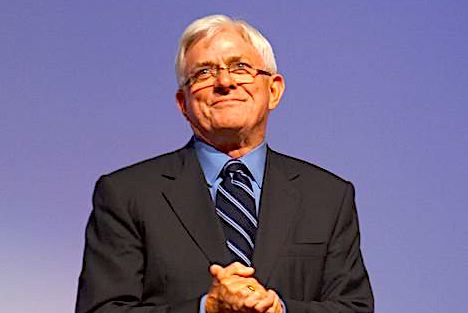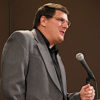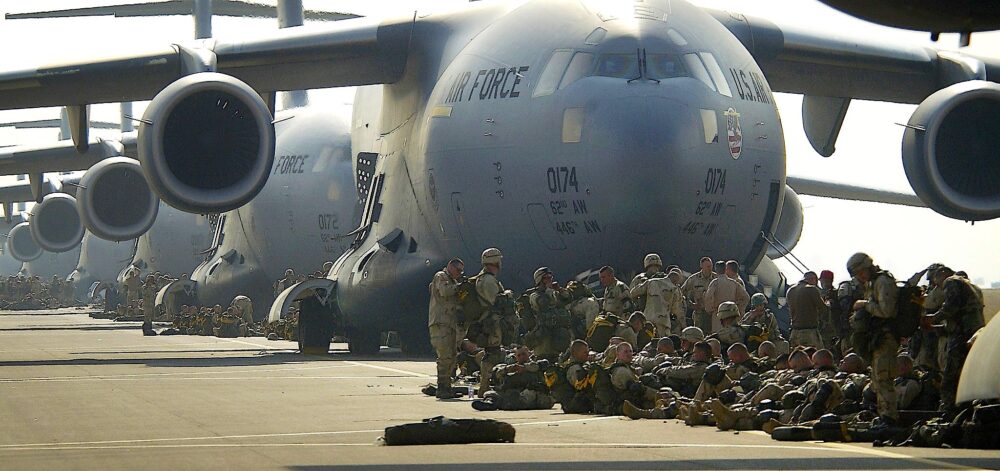Phil Donahue, the legendary American television talk show host, died Sunday at 88. The author recalls his appearances on Donahue’s top-rated show as he questioned the rationale to invade Iraq in 2003.

Phil Donahue introduces the North American premiere of the documentary Body of War at the Toronto International Film Festival. (jbach/Flickr)
By Scott Ritter
Telegram

I got to know Phil in 2002, when he returned to the television talk show circuit on MSNBC as the host of Donahue.
America was, at that time, collectively beating the drums of war, with the Bush administration making the case that Iraq possessed weapons of mass destruction that posed a threat to world peace sufficient enough to justify a military invasion.
Phil, however, thought it was important to ask questions before signing on to the government case for war. He asked his producer, Jeff Cohen, to find a voice in opposition to the war. Jeff called me, and asked if I would be the guest on Phil’s premier. I accepted.
Donahue premiered on July 12, 2002. More than a million people tuned in, making it the top-rated show in America in prime time. As Eric Boehlert wrote in Salon Magazine,
“It was telling that Donahue’s first guest on the inaugural show was Scott Ritter, the former United Nations weapons inspector turned dove, who argued the United States today has no basis to declare war on Iraq. An ex-Marine and a proud Republican who spent years inspecting Saddam Hussein’s arsenal, Ritter has been surprisingly absent from the national debate about a new war with Iraq. Donahue fixed that oversight in one night.”
According to Jeff, the decision to bring me on created a storm of controversy within NBC/MSNBC. He wrote about the difficulties in booking voices opposed to the war:
“Not every weapons expert had been wrong. Take ex-Marine and former UN inspector Scott Ritter. In the last months of 2002, he told any audience or journalist who would hear him that Iraqi WMD represented no threat to our country. ‘Send in the inspectors,’ urged Ritter, ‘don’t send in the Marines.’
It’s telling that in the run-up to the war, no American TV network hired any on-air analysts from among the experts who questioned White House WMD claims. None would hire Ritter.
Inside MSNBC in 2002, Ritter was the target of a smear that he was receiving covert funds from Saddam Hussein’s government. The baseless slur was obviously aimed at reducing his media appearances. It surfaced like clockwork at MSNBC when we sought to book Ritter as a guest on Donahue.”
The famous American journalist and political commentator, Bill Moyers, asked Donahue about this in 2007:
BILL MOYERS: You had Scott Ritter, former weapons inspector. Who was saying that if we invade, it will be a historic blunder.
PHIL DONOHUE: You didn’t have him alone. He had to be there with someone else who supported the war. In other words, you couldn’t have Scott Ritter alone. You could have Richard Perle alone.
BILL MOYERS: You could have the conservative.
PHIL DONOHUE: You could have the supporters of the President alone. And they would say why this war is important. You couldn’t have a dissenter alone. Our producers were instructed to feature two conservatives for every liberal.
BILL MOYERS: You’re kidding.
PHIL DONOHUE: No this is absolutely true.
On Feb. 25, 2003, [three weeks before the March 19 invasion of Iraq] MSNBC canceled Donahue, its top-rated show.
An internal NBC report described host Phil Donahue as “a difficult public face for NBC in a time of war,” noting that senior management worried that Donahue’s show could become “a home for the liberal antiwar agenda at the same time that our competitors are waving the flag at every opportunity.”
The straw that broke the camel’s back was my last appearance on Donahue, on Jan. 15, 2003. I appeared side by side with Richard Butler, my former boss at the United Nations.
The transcript speaks for itself:
DONAHUE: Mr. Ritter, a comment on the final point that he made-briefly, please.
RITTER: What I’ll say is this, is, I take strong disagreement with the contention that you know that Iraq has weapons of mass destruction.
BUTLER: Oh, come on, Scott. That’s on the public record.
RITTER: Of course it’s not. The public record actually says, with all due respect…
BUTLER: You signed the papers to me, when you worked for me, advising me-with all of your intellect and knowledge, you signed pieces of paper to me saying that Iraq has hidden weapons of mass destruction.
RITTER: Never. I signed pieces of paper to you that said we have credible intelligence information that says Iraq has it. And I asked you permission to carry out an inspection. But, understand, it’s an investigation. You just made a definitive statement that says you know Iraq has weapons of mass destruction. But, with all due respect, Richard, that is never reflected in any of the documents, even the one you just mentioned.
BUTLER: That’s not true.
RITTER: It is true. I have it here tonight. Do you want to go through the document page by page and show the people?
DONAHUE: Well, probably not.
(LAUGHTER)
BUTLER: It’s absolutely established that Iraq has not accounted for…
RITTER: Bingo. I agree with that, has not accounted for. But that’s an accounting issue.
BUTLER: So, where are the 500 shells with mustard in them? Where is the 400 tons of…
RITTER: These are good questions, but do you have evidence that they have it?
BUTLER: Where are the missiles?
RITTER: Do you know they have it for a fact, that they possess it as we speak? Or is the problem that Iraq has provided an accounting that we don’t have evidence to back it up, that we can’t confirm the Iraqi version of disposition? My point is…
BUTLER: Why are you assuming such a degree of innocence on the part of the Iraqis?

U.S. Army paratroopers of the 173rd Airborne Brigade prepare to board C-17 Globemaster III’s bound for Iraq on March 23, 2003 at Aviano Air Base, Italy. (U.S. Air Force photo by Tech. Sgt. Stephen Faulisi)
RITTER: Because 200,000 Americans are going to war based upon a perception of a threat. You testified before the U.S. Senate that Iraq has these weapons. And people listened to you and they gave that credibility, when the fact is, you do not know with absolute certainty that Iraq has these weapons.
BUTLER: Scott, the United States…
(APPLAUSE)
RITTER: And I’m not going to stand by and let Americans die in combat because people like you mislead the American Congress. I just won’t allow that to happen.
BUTLER: Oh, for God’s sake, for God’s sake, I mislead the American Congress?
RITTER: You said you know where the weapons are. Where are they?
BUTLER: Please allow me to finish. There is on the record at the United Nations pieces of paper signed by you…
RITTER: I have them here.
BUTLER: … addressed to me, saying, these people have concealed weapons. Please authorize me to go find them.
RITTER: And you signed those documents.
BUTLER: Sometimes I did and sometimes I told you no.
RITTER: Give me an example when you said no.
BUTLER: I told you no because I thought what you were doing was excessive.
RITTER: Give me an example, Richard.
BUTLER: Come on.
RITTER: No, please, in front of the people here tonight. You’ve said this many times. You’ve brought my credibility into question. I can document every time we’ve met, every time I briefed you, and every time you signed it. Please, for the benefit of the public tonight, one example of when you turned me down.
Phil Donahue cut off the debate at that point.
It should be noted that the documents I referred to were part of the archive seized by the F.B.I. when they raided my home on August 7.
I last saw Phil Donahue at the Fighting Bob Festival, in Wisconsin, in 2008. He was in good spirits, and we exchanged reminisces of the time we tried to stop the war in Iraq which was, at that time, still raging.
We had both been proven right in our opposition to this war.
Those who promoted the war continued to draw large salaries in their jobs at NBC and MSNBC, while Phil and I spoke to local crowds in Chautauqua.
Looking back, Phil and I got the better of the deal.
We retained our honor and integrity.
Phil Donahue died this past Sunday.
And with his passing went one of the last honest journalists in America.
Scott Ritter is a former U.S. Marine Corps intelligence officer who served in the former Soviet Union implementing arms control treaties, in the Persian Gulf during Operation Desert Storm and in Iraq overseeing the disarmament of WMD. His most recent book is Disarmament in the Time of Perestroika, published by Clarity Press.
The views expressed are solely those of the author and may or may not reflect those of Consortium News.

No comments:
Post a Comment
Note: Only a member of this blog may post a comment.